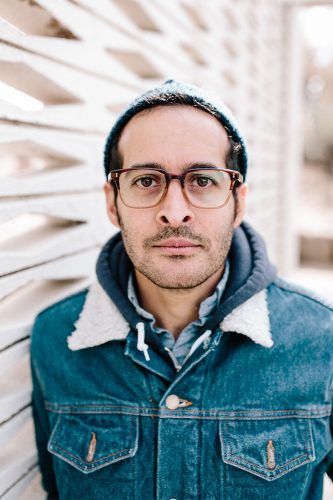
Oregon has a new official poet laureate. On May 4, Anis Mojgani became the 10th poet to enjoy that slightly archaic-sounding title — and the first to come from the poetry slam world. He succeeds Kim Stafford and is to serve a term of two years.
An Iranian American who is also part African American, Mojgani isn’t your tweedy English professor type. He has twice been an individual champion at the National Poetry Slam and is a winner of the International World Cup Poetry Slam. His work owes as much to the frenetic energy of hip hop as it does to William Wordsworth or Robert Frost. He has published five books of poetry, the most recent being In the Pockets of Small Gods in 2018.
We talked with him by phone from his home in Portland.
EW: How is the lockdown going for you?
Anis Mojgani: It’s a mixed bag. You know, in the large scheme of things, so much of my life is not any different. Before quarantine, my day was mostly, I’d get up in the morning, I’d walk to the coffee shop, I’d do work, I’d come home and then be at home. So that was my day to day. And so even though I don’t go to the coffee shop, my day is still fairly the same.
I find myself not being able to focus as much as I would like to.
How do you get to be a poet laureate? Does a person apply?
At least for Oregon how it works is, a number of different organizations that sponsor it open it up to the Oregon community to invite people to nominate people. And so I got an email saying that I’d been nominated and asking me to fill out an application if I was interested.
Then their selection committee goes through all those applicants and they select someone. And then they take that person as a recommendation to the governor and then the governor signs on or off on that, I guess signs yea or nay on it. And then that’s that.
What is going to be your agenda?
Some of it has to be kind of reassessed at this juncture. There’ll be not really any traveling that I’ll be doing at the moment. One of the things that’s really important to me about poetry is introducing poetry to people and making it a thing that, perhaps, they recognize that they have permission to engage with. For many of us, poetry is a tricky thing.
One of the things that I’m really interested in is how to allow people to engage with poetry and to allow that engagement to be shared.
When I was looking at your videos, I thought, oh my god, this guy could be a wildly successful standup comic. Have you thought of that?
I guess that’s not necessarily my forte. Any jokes that I ever write are ones that are very much built out of back and forth between different voices, and less about coming from a singular person telling funny stories. So for me, my relationship with standup is always one, it’s like, I just want to get up on stage and do, like, really strange stuff in a standup environment.
Anything that I would want to do on a standup stage would be very Andy Kaufman. The only standup bits that I’ve ever written are just very, very odd and slightly uncomfortable to do. When I’m on stage, I describe it as me existing in a space with an audience for anywhere from 20 minutes to an hour and a half.
That’s interesting that you say “when I do shows” as opposed to “when I do readings.”
It’s not a reading to me. What it is, is an engagement with the audience, and how I engage the audience is largely through the poems. But there’s also the opportunity to banter. So there’s definitely like, you know, I think some, some correlation with standup.
When you are composing a poem, do you start on the page or with your voice?
It’s always just the page, even though I’m a firm believer in the fact that poetry has its roots as an oral art form. Poetry begs to be spoken aloud, like the ways in which individuals craft good and beautiful language. It asks its reader to feel those words in their mouth and to hear them out loud. I believe wholeheartedly in that. But I also wholeheartedly believe that the writing of a poem is written in depth for me.
Your website has a really interesting name: The Piano Farm. Where did that come from?
So many years ago, back when I was in college, one of my good friends and my roommate at the time, Adam, he said something to me, and I misheard him. I was like, “Did you say, ‘The piano farm?’” And he said, “No.” And I was like, all right, I’m doing that.
This interview has been condensed and edited for clarity. Read more about Mojgani at ThePianoFarm.com.